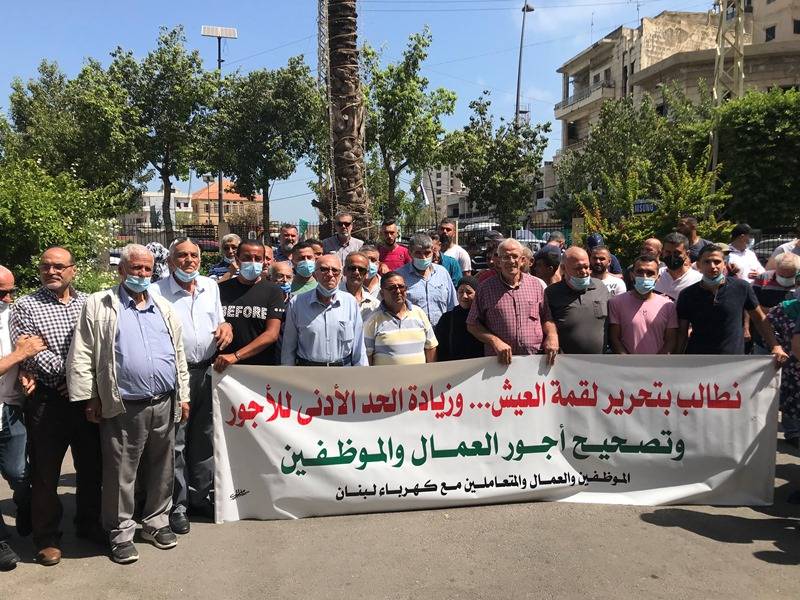
Protesters who work for Électricité du Liban hold a sign that reads, "We demand the liberation of our daily bread ... an increase to the minimum wage and the adjustment of the wages of workers and employees." (Credit: NNA)
BEIRUT — Government formation, the maintenance of subsidies and salary increases were at the heart of labor unions’ demands as they went on strike across Lebanon on Wednesday, union representatives told L’Orient Today.
“We have two core demands: The first is to form a cabinet as soon as possible because the caretaker government is not responding to our concerns. … The second aim … is to refuse the lifting of subsidies,” said Georges Alam, the labor relations secretary at the General Confederation of Lebanese Workers.
The unions’ daylong strike, called to protest deteriorating living conditions amid the country’s ongoing economic and political crises, began on Wednesday morning with a short-lived demonstration blocking the highway in both directions near the Palma resort on the approach to the northern city of Tripoli.
Similar brief protests stretched from in and around Beirut, including the Dora roundabout; to the Bekaa Valley, including Baalbeck and Hermel; the South, from Nabatieh and Marjayoun to Saida to Sur; up to Metn, northern Lebanon and the Akkar region.
Protesters shut down local municipal buildings; branches of the state electricity utility, Électricité du Liban; private and public schools; and other state and private institutions.
The strike comes as Lebanon is in its 10th month without an empowered cabinet, following the resignation of Hassan Diab’s government in August, and amid the looming prospect of an end to government subsidies on essential goods, including wheat, fuel and medicine.
A. Walid Ezz El Din Grady, the secretary-general of the private school teachers’ union, said his organization supports the confederation’s demands, especially regarding cabinet formation.
In the absence of an empowered cabinet, “there is no entity that can help or support us. Our only way out is through a new economic plan set by a cabinet,” Grady told L’Orient Today.
However, he also said a key demand of his union’s strike is a salary increase, explaining that private-sector teachers continue to be paid in lira at the official exchange rate of about LL1,500 to the dollar, even though the lira has devalued 88 percent on the parallel market. The lira is now trading at about LL13,000 to the greenback. Some private school teachers have also had their salaries reduced due to budget cuts.
As the financial crisis deepens, schools have seen their overhead costs rise, while tuition and other fees have simultaneously become less and less affordable for parents whose salaries have similarly devalued and whose savings are often subject to capital controls imposed by commercial banks.
While an increase in salaries is also high on the agenda of Yousef Ezzedine, the vice president of the union of municipalities, workers and employees in Lebanon, perhaps more crucial is the body’s demand that its members qualify for a cash assistance scheme being considered by the government. The proposal would see monetary assistance disbursed to 750,000 of Lebanon’s most vulnerable families.
We “demand to be included in prepaid cards because our workers are financially struggling, especially those in the fourth-class category [unskilled workers], whose salaries don’t exceed $100 per month” at the black market rate, Ezzedine said.
While for now the unions’ protest is planned for a single day, the confederation’s Alam said the trade unions, federations and leagues will meet “to discuss how to move forward with the demands and [to] pressure concerned entities to take appropriate actions.”
He added that “a union body will be formed to make strategic plans to push forward the demands.”
But, he emphasized, “we don’t want to stop the private sector’s work or stagnate it with ongoing strikes, because we are well aware that they are the only entity generating money for the country.”